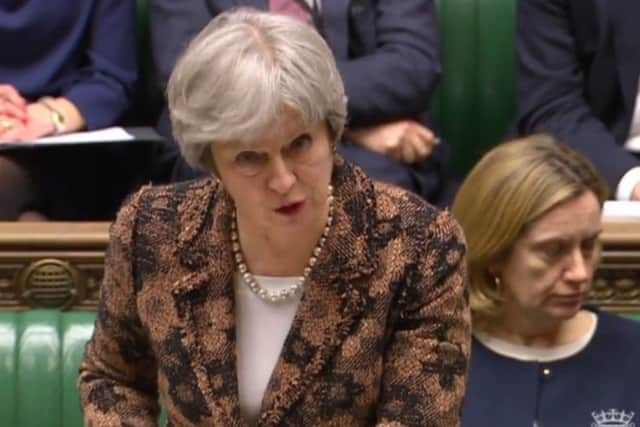UK could impose '˜extensive' sanctions on Russia for poison attack
Investigators have established the “military grade” nerve agent used against Sergei Skripal and his daughter Yulia was one produced by Russia, the Prime Minister told MPs.
Russia’s ambassador has been given until the end of today to explain Moscow’s involvement after being summoned by the Foreign Secretary yesterday afternoon.
Advertisement
Hide AdAdvertisement
Hide AdThe UK’s National Security Council will meet again tomorrow to discuss its response to what Mrs May called an “indiscriminate and reckless act against the United Kingdom”.


First Minister Nicola Sturgeon called for “cool heads” and a “firm response” to the attack. “Russia simply cannot be allowed to launch attacks on our streets with impunity,” she posted on Twitter.
Jeremy Corbyn called on the Russian government to explain its role but was attacked by MPs, including some from his own party, after using the Prime Minister’s statement to criticise the Tories over donations from sources with links to Russia.
Talks have already been held with the UK’s allies at a senior official level to inform them of the findings by investigators in Salisbury, and to co-ordinate a response.
Updating the House of Commons, the Prime Minister said: “This morning I chaired a meeting of the National Security Council in which we considered the information so far available.


”As is normal, the council was updated on the assessment and intelligence picture, as well as the state of the investigation. It is now clear that Mr Skripal and his daughter were poisoned with a military-grade nerve agent of a type developed by Russia.”
A spokeswoman for the Russian foreign ministry dismissed the Prime Minister’s statement as a “circus show”. Earlier, Mr Putin refused questions on Russia’s involvement, telling the BBC: “Get to the bottom of things there, then we’ll discuss this.”
Mrs May said the nerve agent, known as Novichok, has previously been produced by Russia, adding that Moscow had a “record of conducting state-sponsored assassinations” and “views some defectors as legitimate targets for assassinations”.
Advertisement
Hide AdAdvertisement
Hide AdShe said the government “has concluded that it is highly likely that Russia was responsible for the act against Sergei and Yulia Skripal”.
Mrs May told MPs: “There are therefore only two plausible explanations for what happened in Salisbury on 4 March: either this was a direct act by the Russian state against our country, or the Russian government lost control of this potentially catastrophically damaging nerve agent and allowed it to get into the hands of others.”
Foreign Secretary Boris Johnson has told Russia’s ambassador that Moscow must “immediately provide full and complete disclosure” of its Novichok nerve gas programme to the Organisation for the Prohibition of Chemical Weapons, giving Russia until the end of today to respond, said Mrs May.
Highlighting Russia’s annexation of Crimea, its involvement in conflict in Ukraine, and the killing of the former Russian agent Alexander Litvinenko in 2006, the Prime Minister added: “We have led the way in securing tough sanctions against the Russian economy, and we have at all stages worked closely with our allies and we will continue to do so.
“We must now stand ready to take much more extensive measures.
“Should there be no credible response, we will conclude that this action amounts to an unlawful use of force by the Russian state against the United Kingdom, and I will come back to this House and set out the full range of measures that we will take in response.
“We will not tolerate such a brazen attempt to murder innocent civilians on our soil.”
Commons foreign affairs committee chairman Tom Tugendhat said Russia’s actions were “deeply threatening to the British people”.
Advertisement
Hide AdAdvertisement
Hide AdThe White House said the use of a highly lethal nerve agent “is an outrage” but would not be drawn into saying Russia was responsible.
Ahead of the Prime Minister’s statement, the Russian embassy accused the UK government of playing a “very dangerous game” with British public opinion and warned of the risk of “serious long-term consequences”.
In a statement on the embassy website, a spokesman said: “We would like to stress once again that we are outraged by the anti-Russian media campaign, condoned by the government, that influences the investigation and has a psychological effect on British residents.”